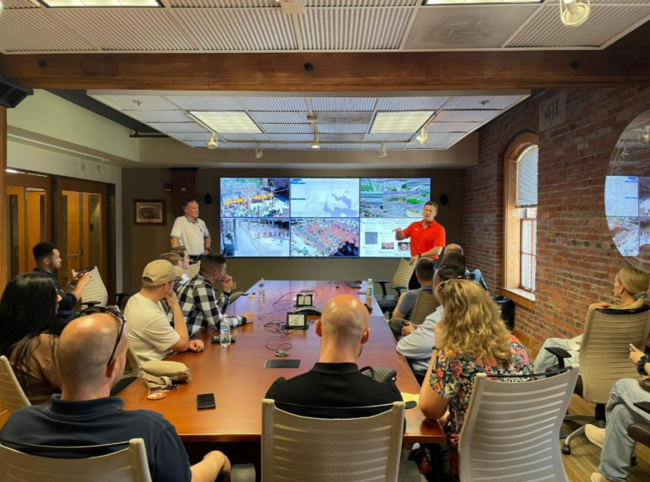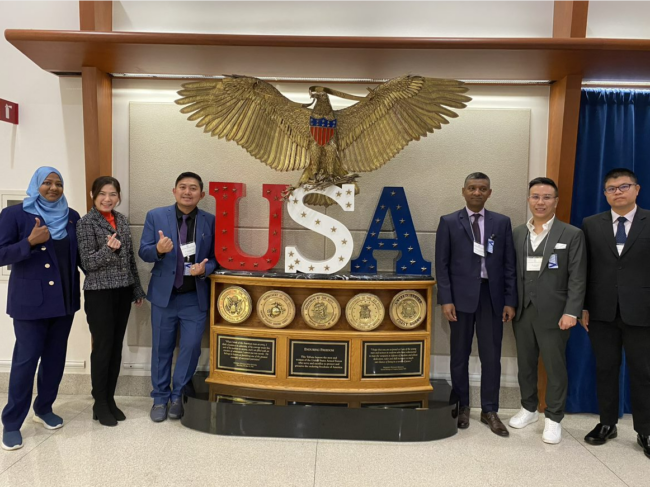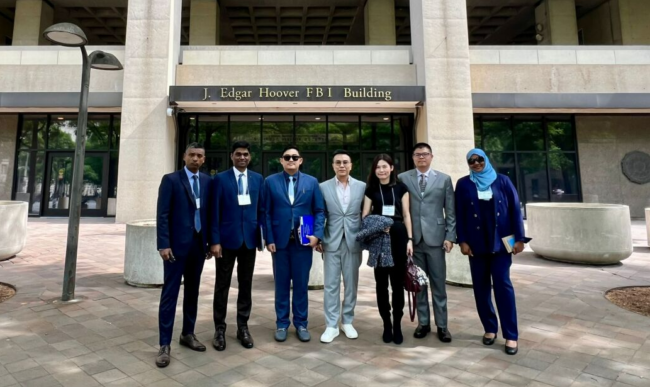By Kim Havenner, Program Officer, Office of International Visitors
The U.S. Department of State’s “Towards a More Safe and Secure World” initiative celebrated its 10th Anniversary in April 2024. This International Visitor Leadership Program (IVLP) has brought more than 430 law enforcement, security, judicial, public officials, academics, and NGO leaders from around the world to the United States over the past decade to meet with their U.S. counterparts and explore cooperative efforts to combat transnational crime.

Photos provided by the Office of International Visitors.
Designed to strengthen relationships with emerging leaders globally, the “Towards a More Safe and Secure World” initiative examines strategies by U.S. domestic agencies, in collaboration with international organizations and partners, to deter and defeat criminal activities such as fentanyl distribution, human trafficking, money laundering, illegal arms trade, and the proliferation of weapons of mass destruction. This professional exchange builds understanding of the interagency dynamics of international security cooperation, promotes bilateral partnerships, and strengthens rule of law capacities in nations around the world. The international participants are nominated by a range of U.S. government organizations, further strengthening our U.S. interagency cooperation.
“Towards a More Safe and Secure World” originated and evolved over the years in response to tragic events. The September 11, 2001, attacks led to seismic changes in U.S. interagency information sharing protocols, including the expansion of Joint Counterterrorism Taskforce (JTTF)s across the country. To introduce international partners to the JTTF model and other cooperative counterterrorism efforts, the U.S. Department of State partnered with the New York FBI Field Office to arrange a Global Crime Conference in New York City, inviting international security experts to participate through IVLP projects.
In response to the 2015 Charlie Hebdo attack in Paris, the U.S. Department of State decided to combine these IVLPs under the umbrella of the new “Towards a More Safe and Secure World” initiative and add a Washington, DC segment, including meetings with the Bureau of Diplomatic Security, the Bureau of International Narcotics and Law Enforcement Affairs, and other federal stakeholders. Over the years, other strategic elements were added to the program, including a workshop hosted by the St. Petersburg Police Department on the operability of task forces and engagements with the U.S. Central Command and U.S. Special Operations Command officials in Tampa Bay addressing the U.S. military’s role in transnational crime cooperation.
A key highlight of the initiative is the participant experience of traveling in small teams to examine local community efforts that address root causes of crime, explore innovations to traditional public safety models, and discuss rehabilitation and recovery strategies including civic and faith-based models.

Photos provided by the Office of International Visitors.
The impact of “Towards a More Safe and Secure World” has been profound. One participant from Bulgaria praised the work of NGOs he encountered: “They are doing such great work…protecting women and kids. Giving opportunity to contact police and make steps forward. This is an example I can bring to my country. As a police officer, I can catch criminals, but our main engagement is to preserve life and help people. Cooperation with NGOs who protect normal people and families is a very good practice.”
The practical value is often immediate. A 2024 participant from the United Arab Emirates plans to collaborate with the New York District Attorney’s Office on their Ghost Guns Initiative to learn how to combat the manufacturing of ghost guns in the Middle East and North Africa.

Photos provided by the Office of International Visitors.
Over time, the impact of the program has yielded highly strategic results. After participating in the initiative, an alumnus from Mexico created a program between Mexican law enforcement officials in Sinaloa, Interpol, U.S. Marshals Service, U.S. Customs and Border Protection, and U.S. Department of State Diplomatic Security officers in Hermosillo, which has returned to Sinaloa more than 15 fugitives of high impact crimes illegally residing in the United States. This same alumnus assisted a fellow IVLP alum from Paraguay to coordinate with Mexican law enforcement to rescue a kidnapped Paraguayan citizen in Baja California and arrest the Mexican kidnappers. Representatives from the U.S. Embassy in Mexico noted, “The benefits of the program are ongoing and hopefully never ending. We are certain that the best is yet to come.”
To curb the threats posed by transnational crime, the United States must work closely with our international partners and allies. This exchange of security professionals is helping us build strategic global networks of cooperation. Reflecting on the last 10 years, special thanks goes to the IVLP implementing partners across the United States who hosted “Towards a More Safe and Secure World” participants in their communities through the years, connecting them to key contacts and sharing valuable insights they brought back to their communities. The people-to-people ties and lines of cooperation fostered through this critical initiative help advance U.S. national security goals and move us closer towards a more safe and secure world for all. We look forward to continuing to work together on future security-related programs in the years to come!
